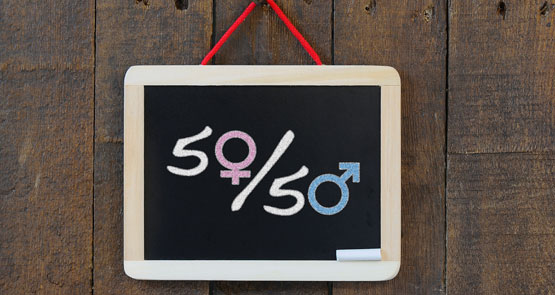
A slim majority of Australian men believe there’s already enough gender equity, today’s Essential Research poll shows — a view profoundly at odds with that of women.
More than a third of voters — 38% — agree with the statement that “Gender equality, meaning that men and women are equal, has come far enough already.” But 51% of men believe that statement, as compared to 26% of women. That is, a narrow majority of men actually believe gender equality “has come far enough”.
 A majority of men — 53% — are also convinced that “gender equality has already been mostly achieved” while just 39% disagree. In contrast, 64% of women disagree and only 30% agree. Men are also significantly more like to believe “work to achieve gender equality today benefits mostly well-to-do people”; 45% of men believe that, compared to 35% of women. Interestingly, it’s older voters who disagree most strongly with the idea that there’s enough gender equality — 60% of over-55s disagree, compared to 50% of under-35s, and 56% disagree that gender equality has mostly been achieved compared to 48% of under-35s.
A majority of men — 53% — are also convinced that “gender equality has already been mostly achieved” while just 39% disagree. In contrast, 64% of women disagree and only 30% agree. Men are also significantly more like to believe “work to achieve gender equality today benefits mostly well-to-do people”; 45% of men believe that, compared to 35% of women. Interestingly, it’s older voters who disagree most strongly with the idea that there’s enough gender equality — 60% of over-55s disagree, compared to 50% of under-35s, and 56% disagree that gender equality has mostly been achieved compared to 48% of under-35s.
However, women are more resigned to the perpetuation of gender inequity; 53% of women believe “men will continue to hold more top business positions than women in the future”, compared to 46% of men who believe that.
With the government perceived to be adrift and Tony Abbott publicly questioning the government’s policies in a number of areas, Malcolm Turnbull’s approval rating has fallen six points to 45%, while his disapproval rating has jumped eight points to 35%, dramatically narrowing his net approval rating. But 24% of Labor voters still approve of Turnbull’s performance, while 13% of Liberal voters disapprove.
Bill Shorten, however, is Mr Steady; his ratings haven’t shifted for five straight months. His approval rating is 27%, the same level as every month back to November, while his disapproval level is 47%, which also dates back to November, except for February, when it was 48%. But Shorten has closed the gap as preferred prime minister. In February he trailed Turnbull 15%-52%, but he now trails the Prime Minister 19%-48%, back where they were in the immediate aftermath of Turnbull’s victory over Tony Abbott. The change has been driven by Labor voters swinging behind Shorten. In February Shorten led Turnbull 36%-28% among Labor voters but now leads by a more convincing 45%-19%, while Turnbull’s lead among Greens voters has shrunk from 13 points to four points.
However, the government’s scare campaign against Labor’s proposed changes to property-related negative gearing to limit it to new housing appears to have had an effect, with voter sentiment drifting away from Labor: 35% of voters support the proposal (down two points) while 39% now oppose it (up seven points), with “don’t knows” falling to 26% — although support tends to split along party lines with Labor voters more in favour and Coalition voters more opposed.
 Unsurprisingly, people who currently rent are more likely to support the proposal (43% to 25%), while home owners are more likely to be opposed, and investors strongly opposed (31% to 58%) However, voters only narrowly approve of negative gearing overall, 41%-37%, with Coalition voters much more strongly in favour than others. Renters, home owners and investors all split again into opposition, support and strong support respectively.
Unsurprisingly, people who currently rent are more likely to support the proposal (43% to 25%), while home owners are more likely to be opposed, and investors strongly opposed (31% to 58%) However, voters only narrowly approve of negative gearing overall, 41%-37%, with Coalition voters much more strongly in favour than others. Renters, home owners and investors all split again into opposition, support and strong support respectively.
On voting intention, Labor is down a point on its primary vote to 37%, while the Coalition remains on 43%, while the Greens are steady on 10%, for an unchanged two-party preferred outcome of 50%-50%.








If a poll was held in the mid-19th century on the status of freed slaves, I think the outcome would be, “Nah, we’ve got enough freed slaves as it is already.”
R/R – the equivalent today would be “the slaves are free enough already”.
As always, polls just scare the bejasuz out of me to think that the respondents are allowed to wander the streets and handle hot objects.
Re Shorten’s popularity…or lack thereof. It reminds me of my former secondary school’s headmaster: nobody liked him but we knew he was efficient at his job.
If Crikey Land denizens read (which would be easy) and understood (which could be far too emotively demanding for quite a few) the Moir & Jessel book “Brainsex”, there could be far less nonsense prattled on these sites than is currently the case.
Dear Bernard
If I didn’t have an important meeting to attend to you and I would be discussing this very seriously, well, sort of.
Your’s Sincerely
Kevin & Julie Harris